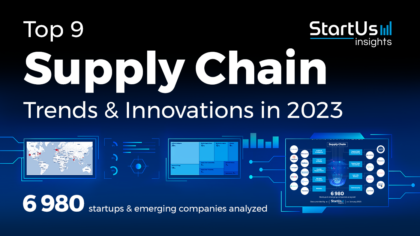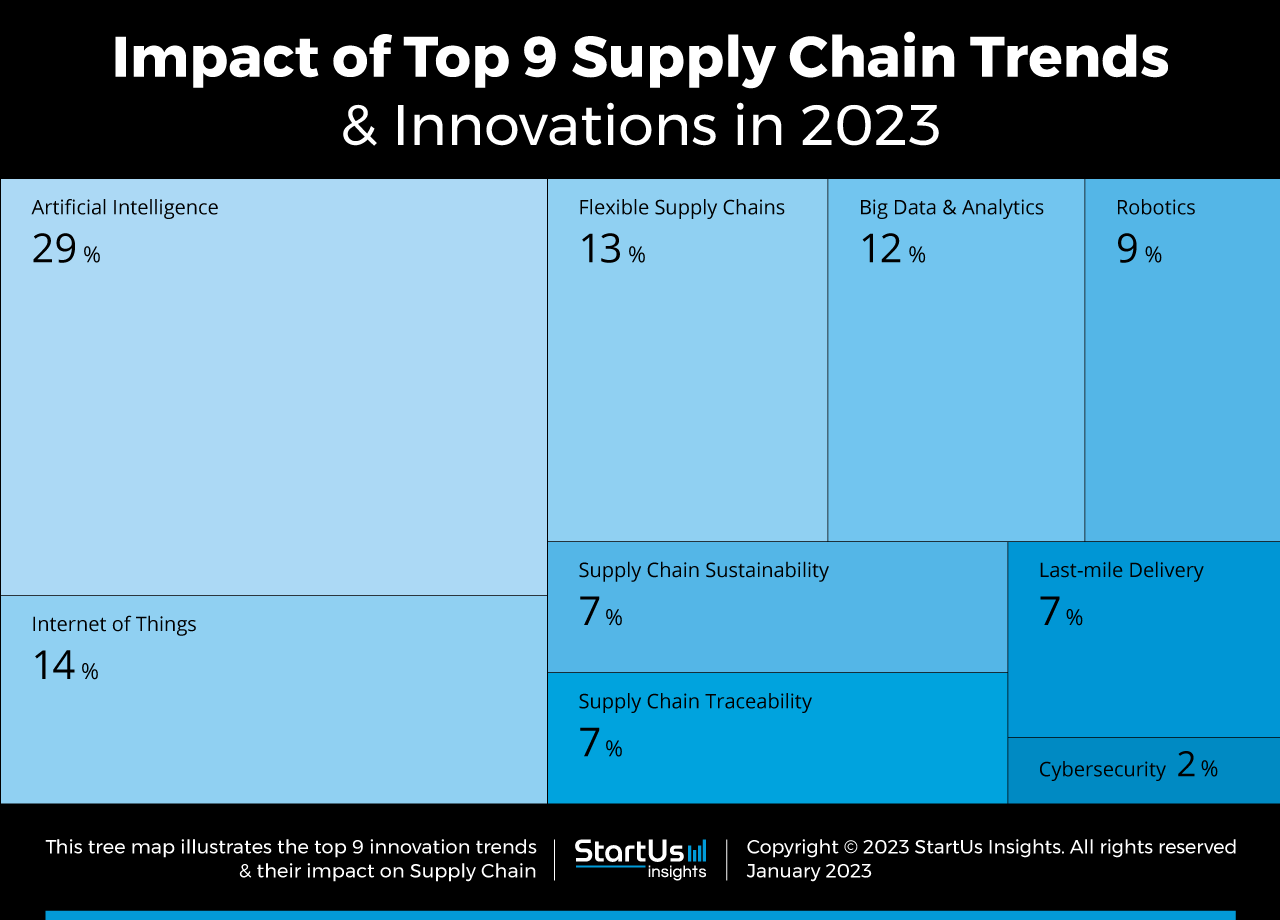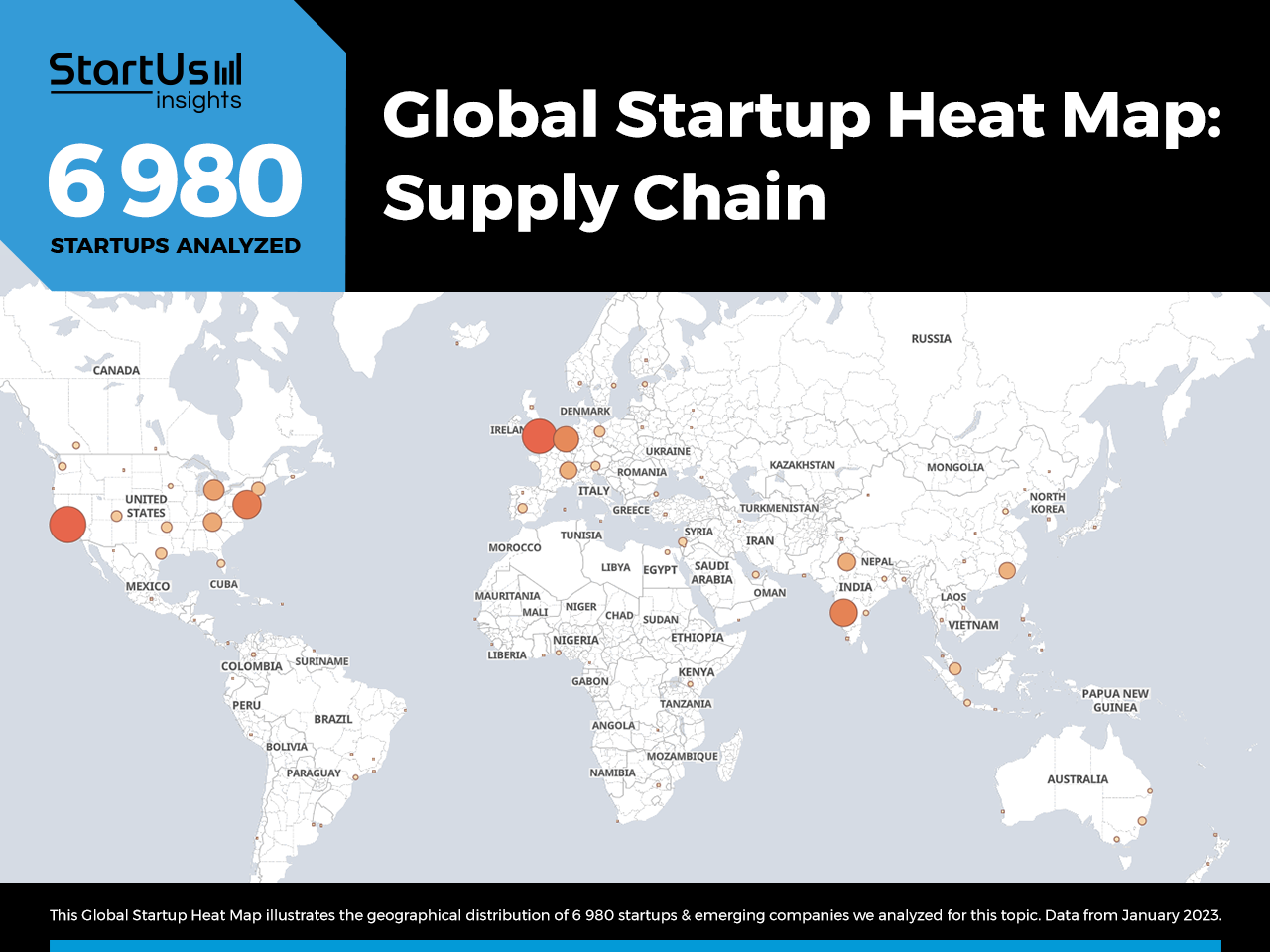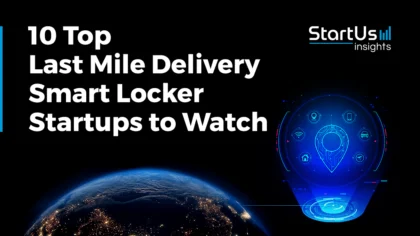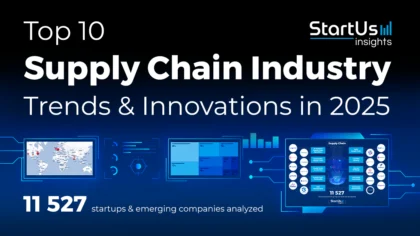Accelerate Productivity in 2025
Reignite Growth Despite the Global Slowdown
Emerging supply chain trends address the industry’s growing needs for autonomous operations, digitalization, and sustainability. The adoption of artificial intelligence (AI) and robotic solutions grows with startups developing supply chain digital twins to simulate physical supply chains, improving forecasting and planning accuracy. Drones and driverless trucks are being used for autonomous last-mile deliveries, while large-scale electrification promotes sustainable goods transportation. Additionally, the Internet of Things (IoT) and blockchain enhance smart logistics and traceability. Also, businesses explore new methods to secure their value chains and promote sustainable operations.
This article was last updated in July 2024.
Innovation Map outlines the 9 Current Supply Chain Trends & 18 Promising Startups
For this in-depth research on the Top Trends in Supply Chain, we analyzed a sample of 6980 global startups & scaleups. This data-driven research provides innovation intelligence that helps you improve strategic decision-making by giving you an overview of emerging technologies in the supply chain industry. In the Supply Chain Innovation Map, you get a comprehensive overview of the innovation trends & startups that impact your company.
Top 9 Supply Chain Trends in 2025
- Artificial Intelligence
- Internet of Things
- Flexible Supply Chains
- Big Data & Analytics
- Robotics
- Supply Chain Sustainability
- Supply Chain Traceability
- Last-mile Delivery
- Cybersecurity
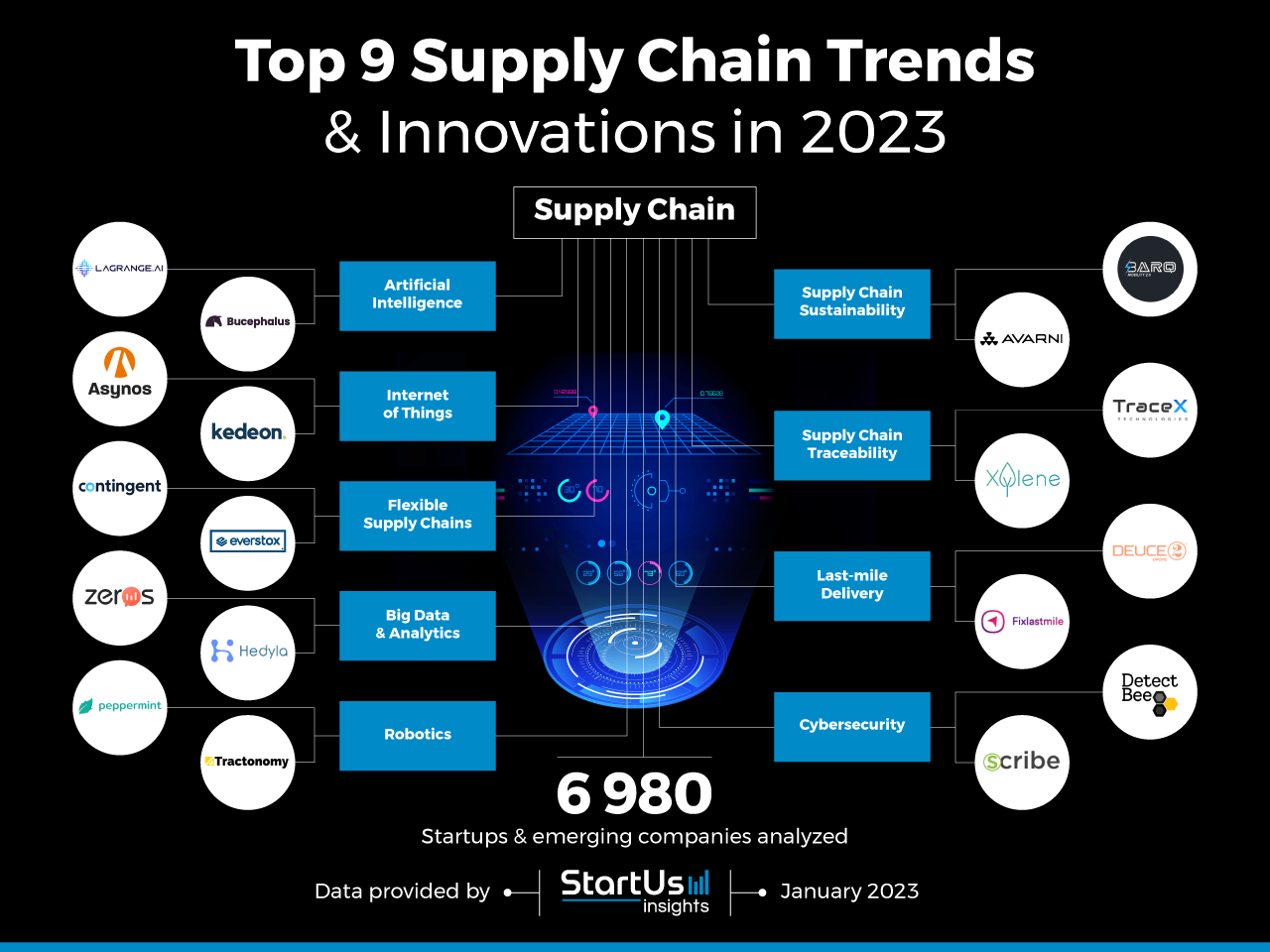
Want to explore all Supply Chain innovations & trends?
These insights are derived by working with our Big Data & Artificial Intelligence-powered StartUs Insights Discovery Platform, covering 4.7M+ startups & scaleups globally. As the world’s largest resource for data on emerging companies, the SaaS platform enables you to identify relevant technologies and industry trends quickly & exhaustively.
Tree Map reveals the Impact of the Top 9 Supply Chain Trends in 2025
Based on the Supply Chain Innovation Map, the Tree Map below illustrates the impact of the Top 9 Supply Chain Management Trends in 2025. Startups and scaleups are automating supply chains using AI and robotics. AI-based models forecast market demand for more accurate capacity planning. Robots facilitate warehouse automation that improves productivity, accuracy, and worker safety. Robotic and drone delivery is also gaining popularity in last-mile operations.
IoT enables asset tracking and remote equipment monitoring while cybersecurity solutions protect digital assets in supply chains against malicious attacks. Further, with the rise in globalization, businesses need to maintain flexible supply chains to mitigate supply chain disruptions due to market changes. Businesses are also adopting sustainable supply chains with circular and reverse logistics solutions.
Global Startup Heat Map covers 6980 Supply Chain Startups & Scaleups
The Global Startup Heat Map below highlights the global distribution of the 6980 exemplary startups & scaleups that we analyzed for this research. Created through the StartUs Insights Discovery Platform, the Heat Map reveals high startup activity in Europe and the US. Below, you get to meet 18 out of these 6980 promising startups & scaleups as well as the solutions they develop. These supply chain startups are hand-picked based on criteria such as founding year, location, funding raised, & more. Depending on your specific needs, your top picks might look entirely different.
Top 9 Supply Chain Innovations & Trends in 2025
1. Artificial Intelligence
The supply chain has several variables that hinder its efficiency, including globalization, government regulations, pandemics, international transportation costs, increasing competition, and more. AI-powered forecasting equips businesses with intelligence to prevent mishaps in the future. It overcomes demand-supply mismatches to prevent overstock or understock of inventory. This minimizes cost and also improves the customer experience. Additionally, AI-based algorithms automate goods retrieval from warehouses for smooth order fulfillment.
Chatbots improve customer service. A supply chain digital twin simulates the physical supply chain to analyze operations and plan process improvements. Further, software solutions such as fleet management or transport management platforms optimize routes for a faster and more economical movement of goods. AI-powered autonomous vehicles are also gaining popularity as they reduce driver costs for delivery.
Lagrange builds Supply Chain Digital Twins
Australian startup Lagrange develops supply chain digital twins. The startup uses AI-driven process mining to extract, analyze, and model supply chain data. It also stores the data in a data warehouse, connects with enterprise management software, and facilitates interoperability. By allowing multiple management systems to communicate with each other, the startup’s solution improves end-to-end supply chain visibility.
Bucephalus offers Inventory Forecasting
US-based startup Bucephalus assists small and midsize businesses (SMBs) in inventory forecasting. It uses AI modeling and data science to identify trends from previous sales and predict the minimum order quantity (MOQ) and lead time of inventory. This allows users to ensure the right amount of stock and order materials at the right time to prevent loss of sales due to understocking.
The startup’s solution also considers variations in customer demand due to seasons, holidays, and more. This further enhances the accuracy of stocking goods in the warehouse.
2. Internet of Things
With supply chains becoming increasingly complex, IoT-enabled asset tracking ensures transparency and prevents loss. It determines the speed of movement of goods throughout the supply chain. This prepares suppliers and distribution centers to receive goods in time and reduces handling times. Additionally, IoT-equipped smart containers provide data for monitoring cargo quality.
Certain IoT devices monitor temperature, humidity, light intensity, and more in warehouses to ensure demanding goods such as chemicals are stored in appropriate conditions. Moreover, wearable devices automatically deliver data to warehouse workers, thereby removing manual or paper-based data entry.
Trakkia Technologies builds Supply Chain Management (SCM) Software
Indian startup Trakkia Technologies provides real-time supply chain visibility through the integration of IoT, AI, cloud computing, and micro-service architecture. Its solutions streamline supply chain management, offering tools for inventory and warehouse management, returnable and fixed asset management, and yard management. These innovations enable warehousing companies and businesses to optimize stock levels and warehouse space, track assets, and enhance utilization rates, reducing operational costs.
GreenBlock Technologies simplifies Product Authentication
GreenBlock Technologies is an Indian startup that develops a blockchain-powered platform for product authentication, cold chain monitoring, anti-counterfeiting, and more. For instance, the startup’s product authentication solution combines blockchain, NFC, and IoT to create and verify unique asset IDs.
The company also provides a cold chain monitoring solution by integrating IoT into the supply chain to monitor environmental conditions like humidity and temperature. Through these solutions, GreenBlock Technologies enables supply chain businesses to ensure product authenticity and avoid wastage.
3. Flexible Supply Chains
A traditional supply chain is rigid and is prone to breakdown in case of market variations. Flexible supply chains, on the other hand, respond better to short-term or rapid changes in market demand. A flexible supply chain possesses the ability to easily adjust inventory levels, change production or transport capacity, and handle large volumes of materials.
This prevents overstocking of goods and provides agility. As supply chains are now integrated with eCommerce platforms, it provides businesses with a better understanding of customer patterns. Startups also offer supply chain-as-a-service to enable companies to reduce costs and tap new markets easily.
Contingent drives Supplier Risk Reduction
UK-based startup Contingent builds a risk assessment platform. It provides real-time supplier insights to ensure due diligence across various supply chain operations. This ensures that businesses choose suppliers that meet their regulatory requirements. The startup’s supplier risk reduction, therefore, prevents damage to their client’s reputations.
everstox provides Logistics-as-a-Service
German startup everstox offers logistics-as-a-service. The startup’s cloud-based platform provides users with on-demand warehousing and fulfillment. It automates order fulfillment operations like picking and packing for an improved delivery speed.
Moreover, the platform allows companies to track logistic processes and inventory flows in real-time. This way, it enables small businesses to scale faster to the market while ensuring efficiency in operations.
4. Big Data & Analytics
As supply chains generate more data, it is becoming increasingly feasible to identify accurate patterns for capacity planning and cost optimization. For example, analysis of different data types enhances customer experience. Combining past sales data with predictive analytics also facilitates inventory forecasting, preventing overstocking or understocking. Location data improves the efficiency of planning delivery routes for faster operations. Further, big data and analytics find use in the predictive maintenance of assets.
Zeros enables Fulfillment Data Analysis
US-based startup Zeros creates a fulfillment data analysis platform. It collects information from multiple facilities and visualizes them together to present a centralized picture. The platform constantly monitors warehouse activities to offer real-time updates on inefficiencies. Moreover, it provides industry benchmarking and facilitates strategic planning.
Hedyla aids Supply Chain Optimization
Spanish startup Hedyla develops a cloud-based supply chain optimization platform. It features delivery tracking, route optimization, cargo management, warehouse activity planning, and carrier billing. The platform enables scenario simulation of fleets, routes, and inventory.
This allows businesses to compare and analyze supply chain performance in each scenario and pick the most profitable one. Further, it facilitates remote control of operations to ensure efficiency.
5. Robotics
By reducing human errors, robotics improve operational efficiency and reduce warehouse costs. Autonomous robots perform dangerous tasks, preventing risk to human workers. Warehouse robots like autonomous mobile robots (AMRs) move inventory using sensors, AI, and computer vision. Aerial drones quickly scan through the inventory to count goods in order to update the inventory management software.
On the other hand, automated guided vehicles (AGVs) travel along the floor facilities carrying loads. This lowers labor costs and improves scalability. Further, startups develop cobots to pick up items from shelves or handle delicate materials. Moreover, there is an increasing trend of robotic delivery for contactless last-mile operations.
Peppermint Robots builds Material Handling Robots
Indian startup Peppermint Robots creates material handling robots for manufacturing and warehousing. Its robot, TUG AMR, is autonomous and carries tonnes of materials in the warehouse. The robot enables heavy inventory handling with speed, safety, and efficiency.
Another scrubber dryer robot cleans multiple types of industrial floors. This way, the startup’s solutions automate facility maintenance.
Tractonomy develops Towing Robots
Belgian startup Tractonomy makes autonomous towing robots for industrial cart handling. These robots pick and drop non-conveyable or regular goods on the work floors. Eliminating the need for manual labor, they handle heavy items in a safe, quick, and energy-efficient way.
The startup also offers a remote maintenance-as-a-service platform that monitors the robotic fleet to predict malfunctioning.
6. Supply Chain Sustainability
Sustainability is a growing trend in the supply chain industry and promotes the adoption of environment-friendly materials and processes. For example, eco-friendly packaging made of biodegradable materials or reverse logistics to repurpose and recapture value from end-of-life products. Electric vehicles (EVs) are suitable for zero-emission transport of freight or shipment, offering a sustainable alternative. Moreover, businesses are shifting from the take-make-dispose approach to a circular economy where they recycle, repair, or repurpose products.
Barq manufactures Last-mile Delivery EVs
UAE-based startup Barq makes EVs for last-mile delivery. Its electric bicycle, RENA LITE, is suitable for hyperlocal delivery of food, grocery, and medical supplies. The startup’s electric scooter, RENA MAX, is more appropriate for deliveries over a wider radius. Barq also builds a drone for high-speed delivery of parcels, medicines, and more.
Being electric, these vehicles reduce carbon emissions, fuel consumption, and maintenance costs.
Avarni creates a Carbon Data Platform
Australian startup Avarni makes a carbon data platform for carbon reduction. It analyzes carbon data using natural language processing (NLP) to detect the indirect and difficult-to-trace Scope 3 emissions in the supply chains. The platform automates the emissions calculation of suppliers and enables compatible outsourcing.
Moreover, it forecasts future emissions based on multiple scenarios for comparative analysis and allows users to stick to their emission goals, improving sustainability.
7. Supply Chain Traceability
Tracking goods from source to consumer provides companies control over the flow of goods across the value chain. Supply chain traceability facilitates sustainable practices and the use of qualified materials. This ensures the safety of products, especially food and pharmaceutical products. Technologies like blockchain trace each raw material that goes into a product and also shows where the product gets discarded.
Startups develop innovative traceability solutions to inform consumers about the product journey. Such solutions verify the sustainable claims of brands as well as enable ethical consumption.
TraceX ensures Food Safety
Indian startup TraceX develops FOODSIGN, a blockchain-powered agriculture traceability platform. It connects all players in the agriculture supply chain for collaborative data exchange and verification. This ensures transparency and accountability among the stakeholders.
The platform also aids farm management and crop harvest monitoring as well as enables informed decision-making. This way, the startup facilitates remote monitoring and food safety along agricultural supply chains.
Xylene improves Raw Material Transparency
German startup Xylene creates blockchain-based solutions for supply chain traceability. Its solution checks compliance with environmental, social, and governance (ESG) criteria of suppliers, service providers, and customers.
This allows producers and importers to assess associated supplier risks and outsource responsibly. Further, the startup tracks the movement of products across the supply chain, enabling timely response to disruptions.
8. Last-mile Delivery
Last-mile delivery is the final step in the journey of goods to the end consumers. With the widespread use of eCommerce platforms, delivery services are improving day by day. Startups develop innovative solutions such as aerial drones to transport items quickly. These drones are suitable for delivering medicines and grocery items.
Additionally, robots automate the delivery and provide a way for contactless transport of products. They also reduce carbon emissions and pollution, offering a sustainable alternative to fuel-based delivery vehicles.
Deuce Drone advances Drone Delivery
US-based startup Deuce Drone enables drone delivery for brick-and-mortar retail stores. The drones feature an automatic package handling system that takes the product from the retailer’s counter and delivers it to the customer’s location using QR codes.
They feature sensors and a collision avoidance system to improve the safety of the autonomous delivery operation. Moreover, the drones ensure safe and precise landing upon reaching the delivery destination.
Fixlastmile offers Real-time Parcel Tracking
Indian startup Fixlastmile facilities last-mile delivery of food, medicines, water, fast-moving consumer goods (FMCG), retail goods, and other parcels. Its software facilitates real-time parcel tracking and route optimization for smooth deliveries. The software also provides electronic proof of delivery to ensure successful completion.
In case of customer unavailability at the time of delivery, the startup reschedules another suitable delivery time. This way, the startup ensures convenient last-mile delivery and customer satisfaction.
9. Cybersecurity
Globalized and digitalized supply chains are more vulnerable to potential ransomware attacks and data theft. This creates a need for cybersecurity and risk management. Startups are developing vendor risk assessment solutions to mitigate third-party risks. They prevent the purchase of any compromised software or hardware from suppliers. Further, AI-based solutions use pattern recognition to identify any suspicious activity in digital supply chain operations. This protects businesses against data breaches and financial losses.
Secure Forte manages Cyber Supply Chain Risks
Australian startup Secure Forte offers the Forte Vendor Risk Management SaaS platform to streamline supplier assessment, profiling, and risk evaluation. This platform enhances cyber supply chain security by automating communication among contract stakeholders and providing risk-based insights on suppliers. Additionally, the Secure Forte platform features proactive monitoring, utilizing threat intelligence feeds to protect high-impact suppliers.
Scribe Security supports Supply Chain Protection
Israeli startup Scribe Security provides cybersecurity to code development in software supply chains. Its software, SCRIBE, ensures code integrity throughout the software development life cycle (SDLC) and prevents any alteration to the code.
The software also alerts software developers in case they use any malicious or unreliable sources. This enables timely risk mitigation to secure the code from cyber attacks, safeguarding software supply chains.
Discover all Future Trends in Supply Chain Management
Future supply chains are more agile, predictive, and responsive. The industry witnesses a shift from reactive supply chain management to proactive supply chain risk monitoring. The use of artificial intelligence and automation is also on the rise. Newer trends such as supply chain traceability connect all stakeholders, enabling companies to follow products and goods as they move along the value chain. Innovations in last-mile delivery solutions further boost profitability and customer engagement. There is also an increased focus on sustainability and circular supply chains.
The Supply Chain Technologies outlined in this report only scratch the surface of trends that we identified during our data-driven innovation and startup scouting process. Among others, hyperautomation, smart contracts, and smart shipping will transform the sector as we know it today. Identifying new opportunities and emerging technologies to implement into your business goes a long way in gaining a competitive advantage. Get in touch to easily and exhaustively scout startups, technologies & trends that matter to you!
